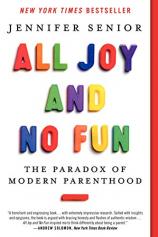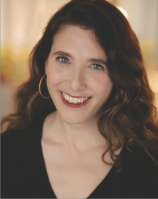Author Talk: March 2014
Jennifer Senior is a contributing editor at New York Magazine and author of ALL JOY AND NO FUN. Here, she talks to bestselling author Curtis Sittenfeld about her new book and considering parenting from both a personal and sociological perspective.
Curtis Sittenfeld: As a journalist, you’ve written about a wide range of topics, including pop culture and politics, so I’m wondering why parenthood is the subject that elicited a book from you.
Jennifer Senior: You’re right, and if this were a parenting book, it wouldn’t even occupy the same hemisphere as the other pieces I’ve done. (Confession: I have purchased exactly one parenting book in my lifetime.) But I consider this a social science book, and I’ve done plenty of social science stories over the years: About the psychological effects of high school on our adult years; about loneliness and cities; about burnout; about our obsession with happiness. Also, I think of this book as a series of mini-ethnographies --- portraits of how American families live now --- and that comes pretty naturally, having been an anthro major. Even when I wrote about the Senate, which used to be often, I treated it as an other-planetary universe with its own alien customs.
CS: This book has its origins in a much-buzzed-about New York magazine cover story. In that article but not in the book, you discussed your own experiences as a parent. Why didn’t you include yourself in the book? Can you share a bit about your family?
JS: So funny: I mentioned my own experience in just two paragraphs of that magazine story, but because they were the first two paragraphs, people misremember it as part-memoir. The only reason I did so --- both early in the magazine story and in this book --- was to alert readers that I, too, was a parent. But the specifics of my own story seem irrelevant, and too idiosyncratic from which to generalize. It’s far better to look at the full spectrum of social science research about families, and to talk to a wide variety of parents.
For the record, though: My husband and I have one six-year-old son, and my husband has two grown kids from a previous marriage. I entered their lives when they were adolescents, which made me realize how complicated that period is for parents.
CS: One of the book’s fascinating tidbits is the implication that parents have friction with teens in some sense because the parents are jealous.
JS: Jealousy is only a small part of it. (Though I’m amazed by Laurence Steinberg’s finding that fathers become depressed when their teenage sons start to date.) What generally seems to happen is that adolescents make their parents take stock of every life choice they’ve ever made --- their marriages and careers especially. Teenagers can be so critical and rejecting that they expose all the holes in their parents’ lives: Now that my kid’s dispensed with me, all I have is my marriage and my job, and I’m not thrilled with either.
CS: In your marriage chapter, you suggest at one point that many moms would be better off being more like dads. Can you explain what you mean?
JS:I only mean this in the sense that fathers seem less frantically perfectionist about their parenting than mothers do, probably because they aren’t burdened by the same unattainable cultural ideals (real or fictional --- Tiger Mom or June Cleaver). It’s a crude generalization, yes, and of course there are exceptions. But both conversations and hard data make it clear that fathers feel much less pressure to play with their children during every free moment, and they’re much quicker to claim their right to free time. If mothers did the same, one wonders what would happen --- “Glad you’re back from that bike ride, now I’m going to the gym!” It’s possible domestic divisions of labor would shift a little in their favor.








